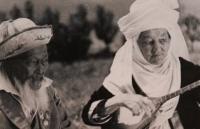You are here
Dina Nurpeisova Museum of Art History.

Tours to museums of Kazakhstan.
“The show raised the importance of folk musical instruments as a means for the development of the musical culture of the broad masses. High skill of playing the Kazakh dombra was shown by Dina Nurpeisova - this "Dzhambul dombra"
Musicologist V. Belyaev. Magazine "Soviet Music".
Excursions tours to Central Asia.
In 1991, in the village of Zhanakala, in the administrative center of the Zhangalinsky district of the West Kazakhstan region, to the 130th anniversary of the master of the Kazakh dombra Dina Nrupeisov, the Museum of Art History named after Dina Nurpeisova was organized and opened.
The museum is located in an old building, which was built in 1972, until some time it housed the children's library of the village. In 2008, the Museum of Art History in Zhanakala, was reorganized into a branch of the West Kazakhstan Regional Museum of History and Local Lore.
The museum consists of 3 halls; here you can see exhibits, some of which belonged to Dina Nurpeisov, for example, a copy of a camisole. The museum contains exhibits by Dina Nurpeisova of other kuishi composers who were born in the Zhangalinsky region.
These are Kurmangazy, Seytek, Okap, Kali, as well as T. Shamelov and Sh. Kazhygaliev and many others. You can see their personal belongings, musical instruments, photographs. The fund of the museum contains about 1,500 exhibits and over 700 copies of photographs, documents, maps, folk musical instruments.
For the 150th anniversary of Nurpeisova, a republican competition of folk music performers was held. The museum was visited by relatives and descendants of the great dombra player - granddaughter Balzhan - daughter of Zhurymbay's son, Bagila - daughter Konyr, Ulmeken - daughter of Baktyly, famous cultural workers of Kazakhstan, art historians, researchers of Dina Nurpeisova's work.
Dina Nurpeisova was born in 1861 in the Beketay-kum locality of the Zhangalinsky District into a poor family. The girl's father Kenzhe played the dombra beautifully, so it was no accident that at the age of five little Dina mastered the instrument.
By the age of nine she performed all the kyuis known to her father. The rumor about the miracle girl playing the dombra spread across the steppe. At the same time, Kurmangazy Sagyrbaev, the founder of the Kazakh kyuy, arrived in the village where Dina's family lived.
After listening to the girl playing the dombra, he praised her, agreed to be her teacher and took care of Dina for the next 11 years - until her marriage. She accompanied the great kuishi on trips to the auls where dombra competitions were held.
Subsequently, the performer recalled these years as the best, happiest, which left deep and bright impressions in her mind. And Kurmangazy called her the best student.
Authority:
Information from the Department of Tourism of the West Kazakhstan region.







